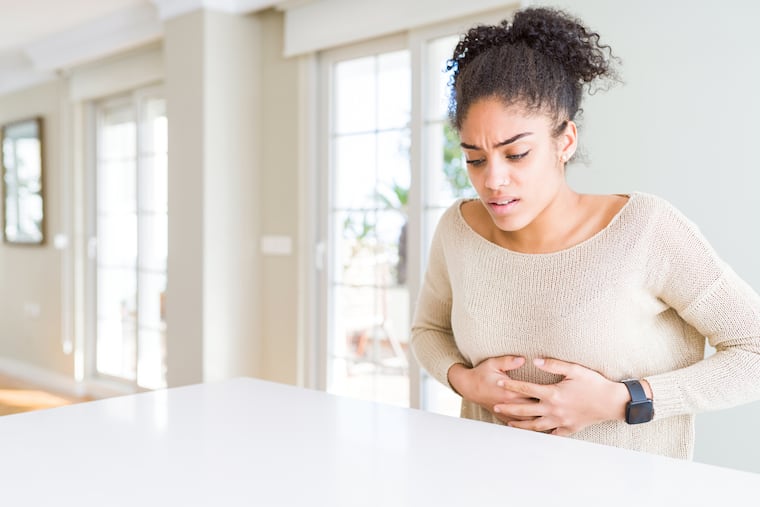Irritable bowel syndrome is more than just a stomach ache. It may lead to eating disorders in teens.
IBS is common in teens: 14 percent of high school students and 8 percent of middle school students were diagnosed with IBS in a study of 507 teenagers.

Abdominal pain, bloating, gas … who hasn’t had these symptoms? They’re embarrassing as an adult, so just imagine how a teenager feels! When these symptoms are frequent, they may be a sign of irritable bowel syndrome (IBS). IBS is common in teens: 14 percent of high school students and 8 percent of middle school students were diagnosed with IBS in a study of 507 teenagers.
The condition should not be overlooked as teens with IBS may alter eating behavior to control the symptoms and may develop an eating disorder as a result.
What is IBS? IBS is a group of symptoms that occur together, including abdominal pain and changes in bowel movements, which may be diarrhea, constipation or both. IBS results when the contents of the bowel can't move along smoothly. Either the muscles don't work at the right speed for proper digestion or coordination of the muscles is interrupted. With IBS, these symptoms occur without any visible signs of damage or disease in your digestive tract. IBS is a chronic condition, so it may cause ongoing bouts of symptoms that your teen will need to manage over time.
Common triggers. Symptoms may flare up during periods of emotional stress. They may also be triggered by eating a large meal or certain foods, such as high-fat or spicy foods, caffeinated beverages, milk or grain products. Girls may notice that they get worse around the time of their menstrual periods. Some medicines, like antibiotics, can also trigger IBS symptoms.
What causes IBS? No one knows exactly what causes it, although it tends to run in families. Researchers believe a combination of physical and emotional problems can lead to IBS. A prior infection (such as gastroenteritis) can change how the digestive system works, which may also increase a person's risk.
Diagnosing IBS. A doctor will need to ask lots of questions that may embarrass a teenager, especially questions about gas, bloating, diarrhea and constipation. Doctors usually diagnose IBS from the patient’s medical history and a physical exam. A doctor may send a patient for tests to make sure the symptoms aren't being caused by other problems like lactose intolerance, Crohn’s disease, ulcerative colitis or celiac disease.
To be diagnosed with IBS, patients must have recurrent abdominal pain at least one day per week in the last three months, on average, and two or more of the following criteria associated with bowel movements:
Either increasing or decreasing pain afterwards;
A change in frequency; and/or
Constipation and/or diarrhea.
How is IBS treated? Although there is no cure for IBS, there are ways to control the symptoms: Pay attention to what is eaten. Trigger foods differ for everyone. Your teen’s doctor may suggest avoiding the following:
High-gas foods such as carbonated and alcoholic beverages, caffeine, raw fruit and certain vegetables, such as cabbage, broccoli and cauliflower;
Gluten, which is found in wheat, barley and rye; and
FODMAPs (Fermentable Oligo-, Di- and Monosaccharides And Polyols), which are found in certain grains, vegetables, fruits and dairy products.
Manage stress. To do this, teens with IBS need to get enough sleep and exercise. Various forms of mental health counseling are also helpful. Cognitive behavioral therapy focuses on thoughts and actions; psychodynamic therapy focuses on how emotions affect IBS symptoms. Therapy often involves relaxation and stress management techniques such as progressive muscle relaxation and progressive guided imagery. In hypnotherapy, the therapist uses hypnosis to help the patient relax into a trance-like state, which can help relax the muscles in the colon.
Consider medication. Depending on the symptoms, doctors may recommend laxatives (for constipation), anti-diarrhea medicines, muscle relaxers (for colon-muscle spasms), or antidepressants (for anxiety and stress).
IBS may increase the risk of eating disorders. Changes in eating habits and nutritional intake were found to be very common in adolescents with IBS compared to healthy teens in one study. More than 40 percent of IBS patients indicated that they skip meals and more than 13 percent vomit after eating to control their symptoms.
My advice? Parents should learn more about IBS and what triggers the symptoms. This is the first step and, by helping your teen feel better, it will hopefully prevent an eating disorder.
Rima Himelstein, MD, is a pediatrician and adolescent medicine specialist at Crozer-Keystone Health System.